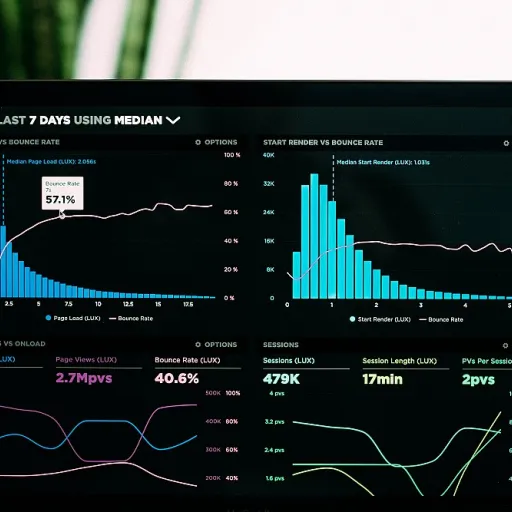
Understanding digital channel strategy in the context of AI
Defining a Digital Channel Strategy in Today’s AI Landscape
In the fast-evolving world of digital marketing, a strong channel strategy is more than just picking the right platforms. It’s about understanding how each digital channel—like social media, email marketing, paid advertising, and search engines—can work together to drive business goals. With artificial intelligence now shaping how brands reach their target audience, the approach to building a digital channel strategy is changing rapidly.
Today, businesses need to consider not only which marketing channels to use, but also how AI-powered tools can help them create, distribute, and optimize digital content. AI can analyze vast amounts of data to identify where your potential customers are most active, what content types resonate with them, and how to adjust your messaging for maximum brand awareness. This means your marketing strategy can become more precise, efficient, and customer-focused.
- Audience targeting: AI helps segment your audience and personalize content for different customer groups across digital channels.
- Content operations: Automation streamlines the creation and distribution of digital content, from blog posts to ads and email campaigns.
- Performance tracking: AI tools monitor how your content performs on each channel, helping you refine your strategy in real time.
Integrating AI into your digital channel strategy also means rethinking how you approach content marketing, social media, and paid advertising. The goal is to create a seamless experience for your customers, no matter which channel they use to interact with your brand. This is especially important for businesses aiming to boost brand awareness and connect with potential customers at every stage of their journey.
For local businesses looking to innovate their digital presence, exploring innovative web design blog concepts can be a valuable step in aligning your channel strategy with current digital trends.
How AI enhances keyword research and intent analysis
Unlocking Deeper Keyword Insights with AI
Artificial intelligence is transforming how businesses approach keyword research and intent analysis. Traditional methods often relied on manual research and basic keyword tools, but AI-powered solutions now allow marketers to analyze vast amounts of search data, uncovering patterns that reveal what potential customers are truly searching for. This shift is crucial for any digital channel strategy aiming to reach the right audience across multiple marketing channels.
- Understanding Search Intent: AI tools can distinguish between informational, navigational, and transactional queries, helping brands tailor their content to match the specific needs of their target audience.
- Semantic Analysis: By analyzing how users phrase their queries, AI can identify related topics and synonyms, expanding the list of relevant keywords and ensuring content aligns with evolving search engine algorithms.
- Predictive Insights: Machine learning models forecast emerging trends, allowing businesses to adapt their content strategy and stay ahead in competitive digital channels.
Aligning Keyword Strategy with Business Goals
AI-driven keyword research supports the alignment of content operations with broader business goals. By integrating data from multiple channels—such as social media, email marketing, and paid advertising—AI helps marketers prioritize keywords that drive brand awareness, customer engagement, and conversions. This ensures that every piece of digital content serves a clear purpose within the overall marketing strategy.
| Traditional Keyword Research | AI-Powered Keyword Research |
|---|---|
| Manual analysis of limited data | Automated analysis of large datasets |
| Focus on search volume | Focus on intent, context, and trends |
| Static keyword lists | Dynamic, evolving keyword clusters |
Enhancing Content Strategy with AI Insights
With AI, marketers can create digital content that resonates with their audience and supports the brand’s channel strategy. AI tools suggest content types and topics based on what is most likely to engage users across different marketing channels. This data-driven approach helps businesses maximize the impact of their digital marketing efforts, whether the goal is to increase brand awareness, drive traffic, or convert leads into customers.
For a deeper dive into how AI-driven SEO strategies can enhance B2B tech marketing, explore this resource on enhancing B2B tech marketing with AI-driven SEO strategies.
AI-driven content creation and optimization
AI-Powered Content Creation: Meeting Audience Needs at Scale
Artificial intelligence is transforming how businesses create and optimize digital content for their marketing channels. By leveraging advanced tools, brands can now produce high-quality, relevant content tailored to their target audience across multiple digital channels, including social media, email marketing, and paid advertising. This shift is not just about automating content production—it’s about aligning every piece of content with business goals and customer intent.
- Personalization at Scale: AI analyzes data from various channels to understand what resonates with different audience segments. This enables businesses to create content that speaks directly to potential customers, increasing engagement and brand awareness.
- Content Optimization: AI-driven platforms assess existing digital content and suggest improvements for search engines and users. This includes optimizing headlines, meta descriptions, and even recommending new content types that align with the brand’s marketing strategy.
- Efficiency in Content Operations: Automating repetitive tasks, such as keyword integration and topic clustering, frees up marketing teams to focus on strategy and creative aspects. AI tools also help schedule and distribute content across the most effective marketing channels, ensuring consistent messaging.
AI’s ability to process large volumes of data means it can identify gaps in your content strategy and suggest new topics or formats that drive results. For example, analyzing customer interactions across digital channels can reveal opportunities to create targeted email campaigns or social media posts that support your overall channel strategy.
Integrating AI into content marketing not only streamlines production but also ensures that every piece of content is optimized for both search engines and the needs of your audience. This approach helps businesses drive more qualified traffic, nurture leads, and ultimately achieve their business goals. For a deeper look at how AI is shaping the impact of marketing on consumer behavior, check out this resource on AI-driven consumer impact in marketing.
Automating technical SEO with artificial intelligence
Streamlining Site Health and Performance
Artificial intelligence is transforming how businesses manage the technical aspects of their digital channels. With AI-powered tools, it’s now possible to monitor and optimize website health in real time. These solutions automatically scan for issues like broken links, slow-loading pages, and crawl errors, which can impact your brand’s visibility on search engines. By addressing these technical challenges quickly, companies can ensure their digital content reaches the target audience efficiently and supports broader marketing goals.
Automated Audits and Actionable Insights
AI-driven audits provide a comprehensive overview of your site’s technical SEO status. Instead of manually checking each page, these tools analyze large volumes of data to identify patterns and prioritize fixes. For example, they can flag duplicate content, missing metadata, or unoptimized images that may hinder your content strategy. This automation allows marketing teams to focus on creating valuable digital content and refining their channel strategy, rather than getting bogged down in repetitive tasks.
Enhancing User Experience Across Channels
Technical SEO isn’t just about pleasing search engines—it’s also about delivering a seamless experience to potential customers. AI can predict how changes to your site structure or navigation will affect user engagement. By simulating user journeys, these tools help brands optimize their digital channels for both search performance and customer satisfaction. Whether you’re running paid advertising, email marketing, or social media campaigns, a technically sound website supports every aspect of your marketing strategy.
- Mobile optimization: AI detects mobile usability issues, ensuring your content is accessible on all devices.
- Site speed: Automated recommendations help reduce load times, which is crucial for both user retention and search rankings.
- Structured data: AI tools suggest schema enhancements to improve how your products services appear in search results.
Scaling Technical SEO for Growing Businesses
As businesses expand their digital marketing channels, maintaining technical SEO across multiple sites and platforms becomes more complex. AI-powered solutions scale effortlessly, monitoring changes and adapting recommendations as your brand grows. This ensures that your content operations remain aligned with your business goals, helping you drive brand awareness and reach new audiences through effective digital channel strategies.
Leveraging AI for competitor analysis and market insights
Uncovering Competitor Moves with AI
Understanding what your competitors are doing across digital channels is essential for refining your marketing strategy and reaching your business goals. Artificial intelligence has transformed the way brands analyze competitors, providing deeper insights into their content, ads, and overall digital presence. AI tools can scan vast amounts of data from search engines, social media, and other marketing channels to identify trends, gaps, and opportunities for your own brand.
- Content Analysis: AI-powered platforms can break down the types of digital content your competitors are publishing, from blog posts to social media updates and email marketing campaigns. This helps you spot which content types are resonating with your shared target audience.
- Keyword and Intent Tracking: By monitoring the keywords and search intent your competitors are targeting, AI tools help you refine your own content strategy and create digital content that aligns with customer needs.
- Ad Intelligence: AI can track paid advertising campaigns across channels, revealing which ads are driving engagement and conversions. This insight supports smarter allocation of your own marketing budget.
Market Insights for Smarter Channel Strategy
AI doesn’t just analyze competitors; it also uncovers broader market trends that can influence your digital channel strategy. By processing data from multiple sources, AI tools reveal shifts in customer behavior, emerging topics, and new opportunities for brand awareness. This empowers businesses to adapt their marketing strategy quickly and stay ahead in crowded digital spaces.
| AI Capability | Benefit for Digital Marketing |
|---|---|
| Sentiment Analysis | Measures audience reactions to your brand and competitors, guiding content operations and messaging. |
| Trend Detection | Identifies rising topics and products services, helping you create timely content and ads. |
| Audience Segmentation | Discovers new potential customers and refines your target audience across digital channels. |
With these AI-driven insights, brands can make informed decisions about which marketing channels to prioritize, how to tailor their content marketing, and where to invest in paid advertising. Ultimately, leveraging AI for competitor analysis and market insights ensures your digital marketing efforts are always aligned with your business goals and the evolving needs of your customers.
The future of digital channel strategy: integrating AI across platforms
Integrating AI Across Your Digital Marketing Ecosystem
Artificial intelligence is no longer just a tool for improving search engines or optimizing keywords. Today, AI is transforming how businesses approach their entire digital channel strategy. By connecting AI-driven insights across channels like social media, email marketing, paid advertising, and content marketing, brands can create a unified and responsive approach to reaching their target audience. AI-powered tools help marketers understand customer behavior across multiple digital channels. For example, machine learning algorithms can analyze how users interact with digital content on social media, email, and websites, revealing which content types drive the most engagement and conversions. This data enables businesses to refine their content strategy, ensuring that every piece of digital content aligns with business goals and resonates with potential customers.Personalization and Automation at Scale
One of the most significant advantages of integrating AI is the ability to personalize marketing messages and automate content operations. AI can segment audiences based on behavior, preferences, and demographics, allowing brands to deliver tailored content through the most effective marketing channels. Whether it’s customizing email marketing campaigns or optimizing paid advertising, AI ensures that every touchpoint is relevant and timely.- Dynamic content creation for different channels, adapting to audience needs
- Automated scheduling and distribution across social media and email
- Real-time optimization of ads and digital content based on performance data
Data-Driven Decision Making for Channel Strategy
AI empowers businesses to make informed decisions about which digital channels to prioritize. By analyzing vast amounts of data from search engines, social media, and other marketing channels, AI identifies trends and opportunities that might be missed by manual analysis. This helps brands allocate resources more effectively, focusing on the channels that drive the most value for their business goals.| Channel | AI Application | Business Benefit |
|---|---|---|
| Social Media | Content optimization, audience targeting | Increased brand awareness, engagement |
| Email Marketing | Personalized messaging, send-time optimization | Higher open and conversion rates |
| Paid Advertising | Bid management, creative testing | Improved ROI, efficient ad spend |
| Content Marketing | Topic discovery, performance tracking | Better audience targeting, content relevance |













